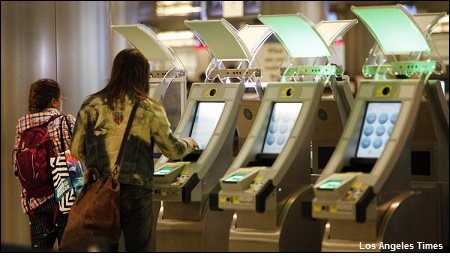
|
|

|
|
| April 26, 2024 |
|
U.S. tightens visa waiver program in response to Paris terror attacks 
WASHINGTON -The United States will begin screening passengers entering the United States under a visa waiver based on any past travel to a country known as a terrorist safe haven, the Obama administration announced Monday.
The new policy was one of several changes announced to the visa waiver program in the wake of the terrorist attacks in Paris Nov. 13. While President Obama has resisted efforts by Congress to impose new restrictions on refugees from Syria, he has indicated a willingness to work with Congress to reform the visa waiver program that allows 20 million visitors into the United States each year. The visa waiver program allows passengers from 38 countries, mostly European countries but also Australia, Brunei, Chile, Japan, New Zealand, Singapore, South Korea and Taiwan, to visit the United States without advance approval for 90 days or less. But the White House also announced Monday that it had asked for a review of whether those 38 counties were cooperating with security reviews, raising the possibility that some countries could be suspended from the program. The United States will also expand the use of fingerprints and photographs to identify passengers, and update its databases to include any past travel to a country considered a terrorist safe haven. Such countries include Somalia, Mali, Egypt, Iraq, Lebanon, Libya, Yemen, Afghanistan, Pakistan, Colombia and Venezuela, according to the State Department. White House Press Secretary Josh Earnest, speaking to reporters outside Paris Monday, said the visa waiver changes would “enhance our security without undermining the international connections that are critical to the strength of our economy.” Earnest said Obama had named Rob Malley, the National Security Council official who helped negotiate the Iran nuclear deal, as a senior adviser on the Islamic State. He also urged Congress to confirm the Treasury Department’s top counterterrorism official, ban people on the “no fly” list from buying guns, and update the legal authority to use military force against terrorist groups. He also put the relatively non-controversial visa waiver issue in the context of a broader battle between Obama and Congress over national security. “For too long, Capitol Hill has been a source of politically motivated posturing, but few if any tangible improvements to our national security. That’s wrong, it’s dangerous, and it falls far short of what the American people deserve,” Earnest said. But Congress was had already considering legislative changes in the visa-waiver program as early as September, when a House Homeland Security Committee task force recommended updating passports to include identifying information embedded in a microchip. House Majority Leader Kevin McCarthy said Monday he expects the House to vote on a visa waiver reform bill by the end of the year. Senate Democrats unveiled proposals Nov. 19 to require interviews at U.S. consulates overseas for any travelers from visa-waiver countries who have visited Syria or Iraq during the previous five years. The senators would also like to require finger-prints, which aren't always provided now, to accompany digital photographs on electronic passports of travelers from visa-waiver countries. Jeh Johnson, secretary of homeland secretary, said Monday he is prepared to work with Congress on legislation strengthening the program, such as requiring electronic passports with security chips from all visa-waiver countries, enhancing screening through Interpol and sharing more information between countries about travelers. "The visa-waiver program is a valuable tool to promote lawful trade and travel with our best foreign allies," Johnson said. "But, as many have noted, ISIL's force consists of foreign terrorist fighters, including thousands from countries in the visa waiver program," he said, using an acronym for the Islamic State of Iraq and the Levant. The Department of Homeland Security will prepare a report within 60 days identifying ways to collect more fingerprints under the visa-waiver program, and to identify penalties and incentives for countries to cooperate more on information sharing. The administration is also asking Congress to make a number of legal changes, including an increase in the penalties for airlines that fail to certify passport information on U.S.-bound passengers. The maximum fine is now $5,000. The Obama administration wants it raised to $50,000. (Source: USA Today) Story Date: December 1, 2015
|